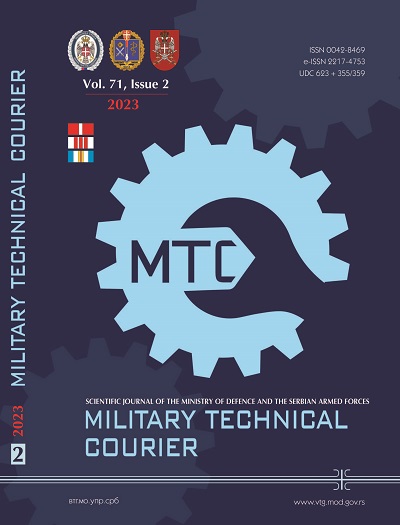A new solution for solving a multi-objective integer programming problem with probabilistic multi - objective optimization
Abstract
Introduction/purpose: In this paper, a new solution for solving a multi-objective integer programming problem with probabilistic multi – objective optimization is formulated. Furthermore, discretization by means of the good lattice point and sequential optimization are employed for a successive simplifying treatment and deep optimization.
Methods: In probabilistic multi – objective optimization, a new concept of preferable probability has been introduced to describe the preference degree of each performance utility of a candidate; each performance utility of a candidate contributes a partial preferable probability and the product of all partial preferable probabilities deduces the total preferable probability of a candidate; the total preferable probability thus transfers a multi-objective problem into a single-objective one. Discretization by means of the good lattice point is employed to conduct discrete sampling for a continuous objective function and sequential optimization is used to perform deep optimization. At first, the requirements of integers in the treatment could be given up so as to simply conduct above procedures. Finally, the optimal solutions of the input variables must be rounded to the nearest integers.
Results: This new scheme is used to deal with two production problems, i.e., maximizing profit while minimizing pollution and determining a purchasing plan for spending as little money as possible while getting as large amount of raw materials as possible. Promising results are obtained for the above two problems from the viewpoint of the probability theory for simultaneous optimization of multiple objectives.
Conclusion: This method properly considers simultaneous optimization of multiple objectives in multi-objective integer programming, which naturally reflects the essence of multi-objective programming, and opens a new way of solving multi-objective problems.
References
Fang, K.-T. 1994. Uniform Design vs. Uniform Design Table. Beijing, China: Science Press (in Chinese). ISBN: 7-03-004290-5 [online]. Available at: https://book.ixueshu.com/book/91793a0541929c0e41e4b4d7d021b3f0318947a18e7f9386.html [Accessed: 01 December 2022].
Fang, K.-T. & Wang, Y. 1994. Number-theoretic Methods in Statistics. London, UK: Chapman & Hall/CRC. ISBN: 978-0412465208.
Fang, K.-T., Liu, M.-Q., Qin, H. & Zhou, Y.-D. 2018. Theory and Application of Uniform Experimental Designs. Singapore: Springer. Available at: https://doi.org/10.1007/978-981-13-2041-5.
Huang, Q., Lv, X., Li, X. & Wang, C. 2017. Modern Optimum Theory and Method. Science Press, Beijing (in Chinese). ISBN: 978-7-03-053961-8/O·6977.31.
Hua, L.-K. & Wang, Y. 1981. Applications of Number Theory to Numerical Analysis. Berlin, Heidelberg: Springer. Available at: https://doi.org/10.1007/978-3-642-67829-5.
Liu, S. 2014. Theoretical Method and Application of Multi-objective Programming. Shanghai, China: Shanghai Jiaotong University Press (in Chinese). ISBN: 978-7-313-10574-5/O.
Ying J. 1988. Multi – objective Progamming. Beijing, China: People's Educational Press (in Chinese). ISBN: 978-7-107-10086-6/G·456.
Zheng, M., Teng, H. & Wang, Y. 2023. Hybrids of Uniform Test and Sequential Uniform Designs with "Intersection" Method for Multi- objective Optimization. Tehnički glasnik, 17(1), pp.94-97. Available at: https://doi.org/10.31803/TG-20211130132744.
Zheng, M., Teng, H., Yu, J., Cui, Y. & Wang Y. 2022c. Probability-Based Multi-objective Optimization for Material Selection. Singapore: Springer. Available at: https://doi.org/10.1007/978-981-19-3351-6.
Zheng, M., Wang, Y. & Teng, H. 2021. A New "Intersection" Method for Multi-Objective Optimization in Material Selection. Tehnički glasnik, 15(4), pp.562-568. Available at: https://doi.org/10.31803/tg-20210901142449.
Zheng, M., Wang, Y. & Teng, H. 2022a. A novel method based on probability theory for simultaneous optimization of multi-object orthogonal test design in material engineering. Kovove Materialy, 60(1), pp.45-53. Available at: https://doi.org/10.31577/km.2022.1.45.
Zheng, M., Wang, Y. & Teng, H. 2022b. A novel approach based on probability theory for material selection. Materialwissenschaft und Werkstofftechnik, 53(6), pp.666-674. Available at: https://doi.org/10.1002/mawe.202100226.
Copyright (c) 2023 Maosheng Zheng, Jie Yu

This work is licensed under a Creative Commons Attribution 4.0 International License.
Proposed Creative Commons Copyright Notices
Proposed Policy for Military Technical Courier (Journals That Offer Open Access)
Authors who publish with this journal agree to the following terms:
Authors retain copyright and grant the journal right of first publication with the work simultaneously licensed under a Creative Commons Attribution License that allows others to share the work with an acknowledgement of the work's authorship and initial publication in this journal.
- Authors are able to enter into separate, additional contractual arrangements for the non-exclusive distribution of the journal's published version of the work (e.g., post it to an institutional repository or publish it in a book), with an acknowledgement of its initial publication in this journal.
- Authors are permitted and encouraged to post their work online (e.g., in institutional repositories or on their website) prior to and during the submission process, as it can lead to productive exchanges, as well as earlier and greater citation of published work (See The Effect of Open Access).

